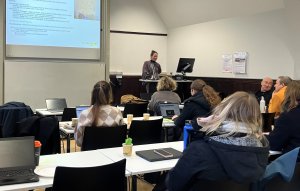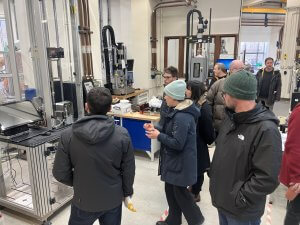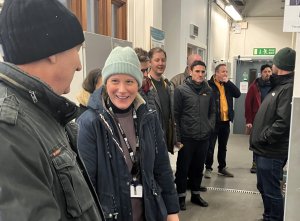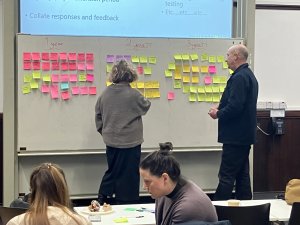Highlights from the 4th Transforming Homes Consortium Meeting
Author: Dr Eleni Toumpanaki, Co-Investigator, University of Bristol
The 4th Transforming Homes consortium meeting took place on 22nd January in one of the most historic buildings at the University of Bristol, the Wills Memorial Building. Sir George Oatley designed this neo-Gothic Grade II listed building with an intention to ‘build to last’. The structure effectively met its intended purpose, built with locally sourced, durable materials such as ferro-concrete, Bath stone, and limestone ashlar. Opened in 1925, it now accommodates the School of Law and Earth Sciences.
The meeting took place on one of the coldest days in January, with temperatures plummeting to 2 °C, and we quickly realised the profound significance of the Transforming Homes project and energy retrofitting, which encompasses not only residential buildings but also historic structures, despite associated challenges of cultural heritage preservation.
In this consortium meeting, greater emphasis was placed on key dissemination activities and the strategic planning of our research objectives beyond Phase 1 of the project (that will end in September 2025). A brief overview of work package (WP) outcomes and future steps was presented in the morning session. The structure of the planned design charettes in Newcastle, Manchester, Norwich and Penzance was presented, aiming to map the diverse socio-economic, climatic and cultural community backgrounds while gathering residents’ experiences and perspectives on transforming homes. The successful completion of the ambitious charrette cart—designed to showcase materials and designs— was shared and has been successfully inaugurated in the aforementioned design charrettes (WP2).
Detailed designs and whole-house retrofit approaches for the Bristol and Swansea homes were presented, emphasising the need for additional space to meet spatial standards, meet storage requirements and create liveable homes (WP3 and WP4). The importance of expanding transformation efforts beyond individual homes to street and neighbourhood level, fostering community empowerment was highlighted in WP5. Broader key stakeholder engagement and strong policy governance were emphasised as essential for scaling high-quality transformation in WP6. A new questionnaire will soon be launched to assess whole-house retrofit skills in the structural, mechanical and electrical engineering, and architectural sectors. Collaborative school activities are planned with the Climate Action Programme at the Knowle West Media Centre (KWMC) to raise awareness about sustainability and career paths in the retrofit sector for students aged 14 to 18 (WP7).
The afternoon session provided an excellent opportunity to reflect on and prioritise our planned dissemination and engagement activities. With over 100 potential reports and publications, physical objects and models, as well as audio and audiovisual outputs listed in our detailed database, this serves as a reminder of the remarkable work accomplished by the Transforming Homes team in such a short time, along with the tremendous potential for future research capabilities.
The last workshop of the afternoon session involved another reflective exercise focused on our future, considering the direction our research could travel in the future. Completing the post-retrofit performance evaluations of the demonstration houses, broadening the dissemination of our research outputs, and expanding research to include street retrofit levels—addressing mould, health, and wellbeing considerations—were among the key areas to prioritise. Further ideas for upscaling retrofit at the neighbourhood, local authority and national levels, including more house typologies, implementing retrofit for climate change adaptation (e.g., increased frequency of storms), developing rapid retrofit diagnosis tools, embedding digital (AI) skills, and utilising a demonstrator home as a training facility were also brainstormed. This is a snapshot of the broad range of ideas that can come to fruition subject to further funding!
Last but not least, Prof Pete Walker, co-Director and a key pillar of the Transforming Homes project, announced his imminent retirement. We are grateful for his valuable contributions and wish him a happy retirement!



 Credits: Francis Moran
Credits: Francis Moran
